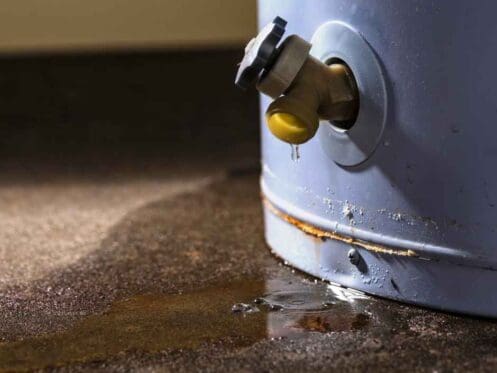A leaking water heater can be a cause for concern, not only because it can lead to water damage but also because it may indicate a significant problem with your appliance. Understanding the common reasons behind a leaking water heater can help you take appropriate action and potentially prevent further issues. In this blog, we will explore the possible causes of water heater leaks, what you can do to address them, and when it might be time to call in the professionals at Charleston Heating & Air.
Common Causes of Water Heater Leaks
Loose or Faulty Connections
One of the most straightforward reasons your water heater may be leaking is due to loose or faulty connections. Over time, the connections to the water heater, such as the inlet and outlet pipes, can loosen or become corroded. This can result in small leaks that may not be immediately noticeable but can cause significant damage if left unattended.
Broken Drain Valve
The drain valve, located near the bottom of the water heater, is used for draining the tank during maintenance or in case of a replacement. If this valve becomes damaged or is not closed properly, it can lead to water leaking from the heater. A broken drain valve can usually be replaced without needing to replace the entire water heater.
Excessive Pressure
Water heaters are designed to operate within a specific pressure range. If the pressure inside the tank becomes too high, it can cause the tank to leak. Excessive pressure can be due to a malfunctioning pressure relief valve or because the temperature setting is too high. It’s crucial to monitor the pressure and ensure it stays within the recommended range to avoid leaks.
Corrosion and Rust
Water heaters, especially those that are not regularly maintained, can develop rust and corrosion over time. This is often a result of sediment build-up within the tank. Once the inner lining of the water heater begins to corrode, it can create small holes and cracks through which water can leak. Regular maintenance and flushing of the tank can help prevent corrosion.
Tank Cracks
Although less common, cracks in the water heater tank itself can lead to leaks. These cracks can occur due to age, wear and tear, or sudden temperature changes that cause the metal to expand and contract. Unfortunately, if your tank is cracked, it typically means you will need to replace the entire unit.
Malfunctioning Temperature and Pressure Relief Valve (T&P Valve)
The T&P valve is a critical safety feature on your water heater that releases water if the temperature or pressure becomes too high. If this valve is malfunctioning, it can cause water to leak. Regularly checking and maintaining the T&P valve can help prevent leaks caused by this issue.
Steps to Address a Leaking Water Heater
If you notice your water heater leaking, it’s essential to take action quickly to prevent further damage. Here are some steps you can take:
Turn Off the Power Supply
For electric water heaters, turn off the power at the circuit breaker. For gas water heaters, set the thermostat to the “pilot” setting. This will prevent any risk of electric shock or gas leakage while you inspect the heater.
Shut Off the Water Supply
Locate the cold water supply valve, usually found at the top of the water heater, and turn it off. This will stop more water from entering the tank and leaking out.
Drain the Tank
Attach a hose to the drain valve and direct it to a floor drain or an outside area. Open the valve to drain the water from the tank. This step is crucial if you need to inspect the tank for corrosion or cracks.
Inspect the Water Heater
Once the tank is drained, carefully inspect the water heater for any visible signs of damage, such as rust, cracks, or loose connections. Pay close attention to the inlet and outlet pipes, the drain valve, and the T&P valve.
Repair or Replace Components
If you identify the source of the leak, you can proceed with repairing or replacing the faulty components. For example, tightening loose connections, replacing a broken drain valve, or installing a new T&P valve can often resolve the issue.
Call a Professional
If you cannot identify the source of the leak or if the problem is beyond a simple fix, it’s time to call in the professionals. Charleston Heating & Air has the expertise and experience to diagnose and repair any water heater issues efficiently.
Preventing Future Leaks
Regular maintenance is key to preventing water heater leaks and ensuring the longevity of your appliance. Here are some tips to keep your water heater in top condition:
- Schedule Annual Maintenance: Having your water heater inspected and serviced by a professional at least once a year can help catch potential issues early and extend the life of your appliance.
- Flush the Tank: Regularly flushing the tank helps remove sediment build-up, which can lead to corrosion and leaks. This simple maintenance task can make a significant difference in the performance and lifespan of your water heater.
- Check the Anode Rod: The anode rod helps prevent corrosion by attracting corrosive elements in the water. Inspecting and replacing the anode rod as needed can protect your tank from rust and leaks.
- Monitor the Pressure: Keep an eye on the water pressure and temperature settings to ensure they stay within the recommended ranges. This can help prevent excessive pressure and reduce the risk of leaks.
- Inspect Connections: Regularly check the connections to the water heater, including the inlet and outlet pipes, the drain valve, and the T&P valve, for signs of wear or damage.
Call Charleston Heating & Air
A leaking water heater is a problem that should not be ignored. By understanding the common causes of leaks and taking proactive steps to address them, you can protect your home from water damage and ensure your water heater operates efficiently. If you ever find yourself asking, “Why is my water heater leaking?” remember that Charleston Heating & Air is here to help. Our team of professionals is ready to diagnose and repair any water heater issues you may encounter.
For all your water heater needs, from repairs to maintenance and installations, contact Charleston Heating & Air today. Our expert team is dedicated to providing top-quality service and ensuring your home stays comfortable and safe. Don’t wait until a small leak becomes a big problem – reach out to us now!

